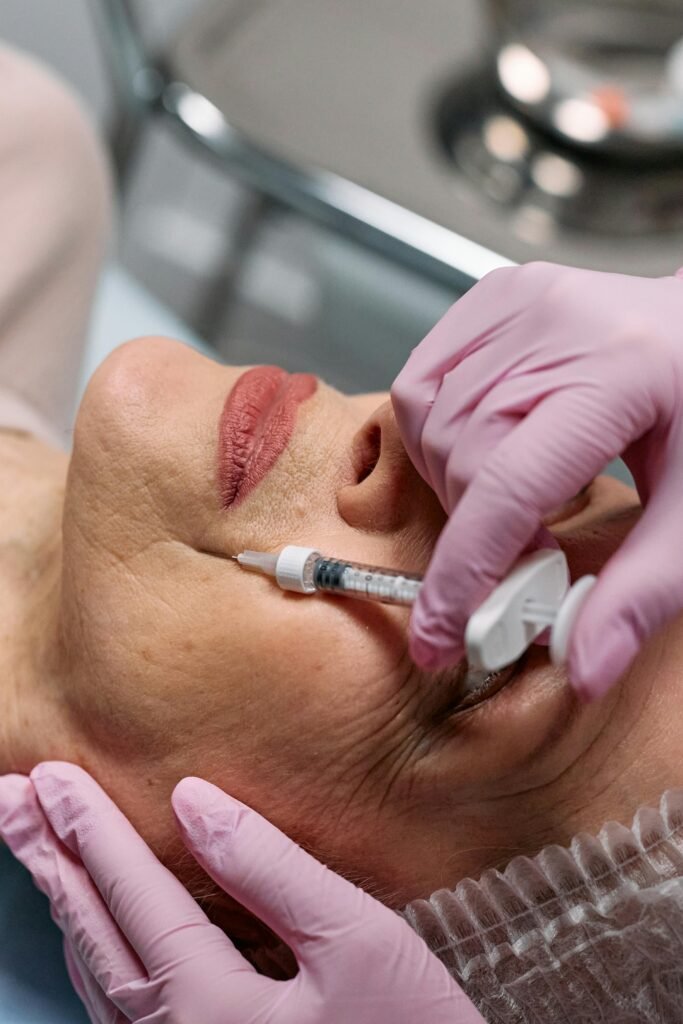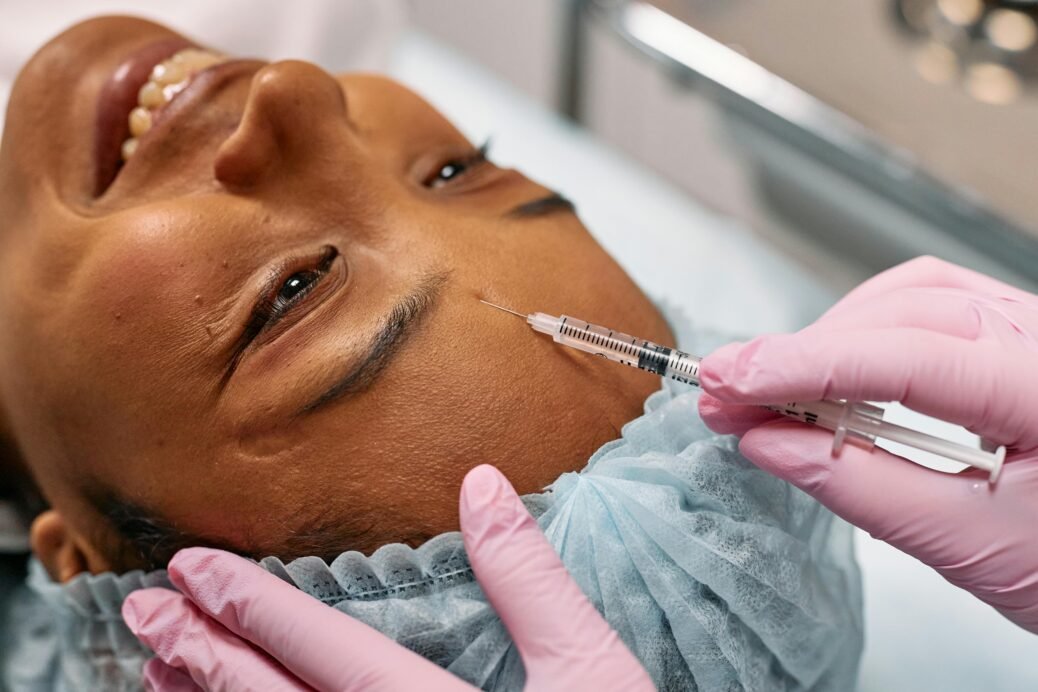The role of a nurse injector is gaining popularity in the field of aesthetics, due to the increasing demand for non-surgical cosmetic treatments. As specialized registered nurses or advanced practice registered nurses, they are trained to perform various aesthetic services such as administering Botox, dermal fillers, and other cosmetic injectables. In this article, we will be shedding light on the nurse injector’s salary, as well as their roles and responsibilities.
Nurse injectors possess a unique skill set and have undergone specialized training to perform these procedures. Their duties include conducting thorough consultations with patients, discussing various aesthetic options, and administering injections meticulously. These professionals must also adhere to strict safety guidelines and stay up-to-date. Ensuring to remain up to date with the latest trends, techniques, and products in aesthetic medicine.
When it comes to a nurse injector’s salary, it can vary based on several factors such as experience, geographic location, and workplace setting. According to Glassdoor, the median salary for a nurse injector in the United States as of 2024 is $107,006 per year, with an estimated additional pay of $6,884. It’s worth noting that entry-level and experienced nurse injectors may experience different salary ranges. It all depends on their skill level and current market demand.
Overview of Nurse Injector Salary
Average Salary Ranges
An overview of the nurse injector salary reveals that the average pay for this profession can vary depending on various factors. As of February 2023, the average annual salary for a nurse injector in the United States is $87,400. It is important to note that entry-level nurse injectors may expect to earn an average of $67,200. While experienced professionals with 10 or more years of experience can earn upwards of $100,000 per year.
In 2024, the average salary for a nurse injector is estimated to be around $107,088 per year, according to Glassdoor. This figure represents the median, which is the midpoint of the ranges based on salaries collected from their users.
Factors Influencing Salary
There are several factors that can influence the salary of a nurse injector. Some of these factors include:
- Education and certifications: A nurse injector’s education, certification level, and specialization can have a significant impact on their salary. For instance, those with higher levels of education and certifications might command higher salaries.
- Experience: Experience plays a crucial role in determining the salary of a nurse injector. Those with more years of experience or expertise in the field are likely to earn higher salaries compared to their less experienced counterparts.
- Geographical location: Nurse injector salaries can also vary depending on the geographical location of their workplace. In some areas, the cost of living and demand for healthcare services can influence the pay scale.
- Employer type: The type of employer also plays a role in determining a nurse injector’s pay scale. Professionals working with large hospitals, clinics or medical practices might have a slightly higher salary compared to those employed by smaller organizations.
- Skills and performance: A nurse injector who demonstrates exceptional skills, knowledge and performance in their role might have a higher earning potential than someone who performs at an average level.
In conclusion, a nurse injector’s salary can vary significantly due to various factors. Understanding these factors can help professionals in this field make informed career decisions and negotiate better compensation packages.
Role of a Nurse Injector

Typical Duties
A nurse injector is a healthcare professional who specializes in administering injections, such as vaccines and medications. These specialists are usually registered nurses (RNs) who have undergone extensive experience and additional training to become certified for this specific role. In the field of aesthetics, a nurse injector might provide services like Botox neurotoxin injections and dermal fillers.
Nurse injectors are responsible for:
- Consulting with patients: Discussing various aesthetic options to achieve desired outcomes.
- Performing injections: Accurately and skillfully using neurotoxins and filler products.
- Patient care: Ensuring proper aftercare and follow-up treatments for patients.
- Maintaining records: Keeping track of patient history and treatment information.
Work Environments
Nurse injectors can find employment in a variety of medical settings. Common work environments include:
- Aesthetic clinics: Providing cosmetic treatments like Botox and dermal fillers.
- Medical offices: Administering vaccines and medication injections as part of patient care.
- Hospitals: Offering specialized care and treatments that require injections, such as immunizations.
The salary for a nurse injector varies based on factors like location, experience, and specialty. On average, nurse injectors can earn around $93,902 per year, although the annual salary can range from $67,200 for entry-level professionals to over $100,000 for more experienced individuals.
In conclusion, the nurse injector role is both diverse and crucial in the healthcare industry. These professionals combine extensive nursing experience with specialized training to administer injections safely and effectively in various healthcare settings.
Essential Qualifications
Education Requirements
To become a nurse injector, several educational qualifications must be met. Initially, one must obtain a nursing degree, which can be either an associate degree in nursing (ADN) or a bachelor of science in nursing (BSN). These programs provide the foundational knowledge and skills necessary for a career in nursing. After completing their nursing degree, individuals must obtain a license by passing the National Council Licensure Examination for Registered Nurses (NCLEX-RN).
Certification and Training
Once licensed as a registered nurse, aspiring nurse injectors should focus on gaining experience in their field and enrolling in additional courses to gain up-to-date education on medical procedures, skin anatomy, injection techniques, product knowledge, and local regulations. Some organizations, such as the American Society of Plastic Surgical Nurses and the International Association for Physicians in Aesthetic Medicine, offer certifications and training specifically designed for nurse injectors.
Furthermore, hands-on experience in a clinical or medical spa setting will be crucial for refining practical skills and learning from experienced nurse injectors. Collaborating with experienced professionals and engaging in continuous education will help aspiring nurse injectors excel in their career.
In summary, essential qualifications for becoming a nurse injector include a nursing degree (ADN or BSN), a registered nurse license, and specialized certification and training in aesthetic procedures. Gaining hands-on experience in this field will ensure that these professionals have the knowledge and skills to provide the best possible patient care.
Skills and Competencies
Clinical Skills
A nurse injector must possess a strong foundation in clinical skills. These skills include, but are not limited to:
- Anatomy knowledge: A thorough understanding of facial anatomy is crucial for successful cosmetic injections. This helps ensure the safety and effectiveness of treatments.
- Injection techniques: Proficiency in various injection techniques, such as using a cannula or needle, is a must. This expertise allows for customized treatment plans based on each patient’s needs.
- Aseptic techniques: Nurse injectors must be well-versed in maintaining a sterile environment during procedures to minimize the risk of infection.
Client Interaction and Communication
In addition to clinical expertise, a nurse injector needs strong communication and interpersonal skills. These are essential for building trust with clients and ensuring a positive experience. Key abilities in this area include:
- Patient consultation: Effective listening and the ability to clearly communicate treatment options are key for aligning expectations and achieving desired outcomes.
- Empathy and bedside manner: Exhibiting attentiveness and compassion enhances a patient’s comfort level, fostering a strong provider-patient relationship.
- Attention to detail: Carefully tracking patient histories, treatment preferences, and post-procedure progress enables a nurse injector to provide tailored care and ensure a safe and satisfying experience.
Being both clinically proficient and possessing exceptional interpersonal skills are vital components for a successful nurse injector. These abilities contribute to a higher standard of care and increased patient satisfaction levels in the growing field of aesthetic medicine.
Career Path

Entry-Level Positions
For those looking to enter the field of nurse injecting, entry-level positions typically require candidates to hold a current Registered Nurse (RN) or Advanced Practice Registered Nurse (APRN) license. Additionally, specialized training in aesthetic procedures, such as Botox neurotoxin injections and dermal fillers, is often necessary. Duties of an entry-level nurse injector may include:
- Consulting with patients about various aesthetic options
- Performing neurotoxin and filler injections
- Developing treatment plans tailored to patients’ needs
At this stage of their career, nurse injectors may earn an average annual salary of $67,200.
Advancement Opportunities
With experience and continuous professional development, nurse injectors can advance their careers and increase their earning potential. Some advancement opportunities include:
- Certifications: Obtaining additional certifications in areas such as aesthetic medicine or injection specialties can showcase expertise and lead to higher salaries.
- Years of Experience: Nurse injectors with 10 or more years of experience can earn upward of $100,000 per year.
- Leadership Positions: Those who develop significant expertise in their field may be promoted to leadership roles, such as clinical supervisor or director of aesthetic services.
| Experience Level | Average Salary Range |
|---|---|
| Entry-Level | $67,200 |
| Experienced (10+ years) | Upwards of $100,000 |
Nurse injectors have the potential for growth both in terms of responsibilities and income while providing valuable aesthetic services to their patients.
Job Market Trends
Demand for Nurse Injectors
The demand for nurse injectors is on the rise, as more people seek non-surgical aesthetic treatments to maintain their youthful appearance. As a result, employment opportunities in this field are increasing. According to the Bureau of Labor Statistics, the job outlook for registered nurses, which includes nurse injectors, is expected to grow by 6 percent from 2021 to 2031.
Along with administering treatments such as Botox and dermal fillers, nurse injectors also consult with patients to discuss their aesthetic goals and recommend suitable procedures. Their responsibilities include performing neurotoxin and filler injections, ensuring patient safety, and maintaining a sterile environment.
Geographic Salary Variations
Nurse injectors’ salaries can vary depending on their location, experience, and qualifications. Based on data from Salary.com, the average annual salary for a nurse injector in the United States was $87,400 as of February 2023. Entry-level professionals earned an average of $67,200, while experienced nurses with over 10 years of experience could earn upwards of $100,000 per year.
Here is a comparison of average nurse injector salaries in some American states:
- California: $91,353
- Texas: $82,302
- New York: $89,221
- Florida: $77,998
In addition to base salaries, bonus pay and other cash compensation also contribute to their total earnings. The median total pay for nurse injectors in the United States is estimated to be $114,061, considering salaries and additional pay.
The geographic differences in salary highlight the importance of researching local job markets when considering a career as a nurse injector. By recognizing industry trends and regional salaries, prospective nurse injectors can make informed decisions about where to work and how to advance their careers.
Benefits and Perks

Health and Retirement Benefits
Nurse injectors can enjoy various health and retirement benefits provided by their employers. These may include comprehensive health insurance covering medical, dental, and vision expenses. Additionally, many employers offer attractive retirement plans with competitive employer contributions, allowing nurse injectors to save for their future.
Moreover, some employers provide life insurance and disability coverage to nurse injectors, ensuring financial security in the event of unforeseen circumstances.
Continuing Education and Professional Development
Investing in professional development is highly encouraged in the field of nursing. As a nurse injector, it is essential to stay updated with the latest techniques, treatments, and best practices. Many employers provide support for continuing education and professional development opportunities, such as:
- Tuition reimbursement for courses related to the nursing profession or aesthetic medicine
- Training workshops to enhance clinical skills in aesthetic procedures, such as neurotoxin and filler injections
- Conferences and seminars to stay informed about the latest industry trends and advancements
By participating in continuing education and professional development programs, nurse injectors can:
- Improve their skills and expand their expertise in providing the best possible care to patients
- Stay current with the latest innovations and standards in the aesthetics field
- Enhance their career prospects and growth opportunities within the industry
Taking advantage of these benefits and perks can help nurse injectors achieve a fulfilling and successful career in the aesthetic medicine field, providing the highest level of care for their patients while enjoying personal and professional growth.
Challenges in the Role
Physical Demands
The nurse injector role can be physically demanding. The job often requires ❲standing and walking for long periods❳ during the day and performing intricate tasks with manual dexterity. Injections must be administered with precision to avoid complications and ensure patient safety. Moreover, nurse injectors must maintain proper infection control procedures, which includes wearing personal protective equipment (PPE) and adhering to strict hygiene protocols.
Emotional and Ethical Considerations
Nurse injectors may face emotional challenges, as they work closely with patients who may be seeking cosmetic treatments due to insecurities or dissatisfaction with their appearance. It is crucial for nurse injectors to treat patients with empathy and understanding, while also managing their own emotions in these situations.
In addition to the emotional aspect, nurse injectors must navigate the ethical considerations of their practice. They must consult with patients regarding various aesthetic options and ensure treatments align with the patient’s desires, while also considering the potential risks and benefits. Balancing the patient’s expectations with the realistic outcomes can be a delicate process, and nurse injectors must approach this responsibility with a high level of professionalism and integrity.
Salary Negotiation Strategies
Understanding Your Worth
Before entering salary negotiations, it is important for nurse injectors to understand their professional worth. This includes evaluating their experience level and researching the average salary range for similar roles. The average annual salary for a nurse injector in the United States is $87,400 as of February 2023, with entry-level nurse injectors earning an average of $67,200 and experienced professionals potentially earning over $100,000.
Factors that can influence a nurse injector’s salary include:
- Years of experience
- Geographic location
- Certifications and training
- Workplace setting (private practice, hospital, etc.)
It is crucial for nurse injectors to have a clear understanding of their qualifications and responsibilities in order to effectively negotiate their salary.
Negotiation Techniques
Nurse injectors should focus on using effective negotiation techniques to achieve their desired salary. Here are a few tips to consider during the negotiation process:
- Prepare and research: Thoroughly research the average salary range for nurse injectors in your location and experience level. Gather data that can justify your salary expectations, such as certifications or notable accomplishments.
- Know your priorities: Determine the most important aspects of your job offer, such as pay, benefits, or work-life balance, and focus on those during negotiations.
- Be confident: Express confidence in your abilities and accomplishments when discussing your salary requirements.
- Practice active listening: Listen to the hiring manager’s concerns or counteroffers and try to address them professionally and confidently.
- Be flexible: While it is important to have a clear salary goal in mind, be prepared to make concessions if necessary. Consider negotiating for other benefits or perks, such as additional vacation days or professional development opportunities, if the employer is unable to meet your desired salary.
- Maintain a professional tone: Throughout the negotiation process, remain calm, respectful, and professional, ensuring that the conversation remains focused on the value you bring to the organization.
By implementing these techniques, nurse injectors can effectively navigate salary negotiations and achieve a fair compensation for their role and expertise.
Legal Considerations and Compliance

State Regulations and Scope of Practice
Nurse injectors are registered nurses (RNs) or advanced practice registered nurses (APRNs) who specialize in providing aesthetic beauty services such as Botox neurotoxin injections and dermal fillers. The legal considerations and compliance surrounding the nurse injector role vary depending on the state regulations.
In some states, there may be restrictions on the types of injections that can be administered by RNs or requirements to obtain additional certification or licensure. It’s essential for nurse injectors to thoroughly understand their state’s regulations and abide by their defined scope of practice. To stay up-to-date with changes in regulations, nurse injectors should frequently consult professional organizations and industry resources.
Malpractice Insurance
Malpractice insurance is an important aspect for nurse injectors to consider. This insurance protects healthcare professionals from liability claims that can arise from their practice. For nurse injectors, possible risks include complications related to the injections, such as infection or injury.
In most cases, nurse injectors are required to carry individual malpractice insurance, since it provides a necessary safety net should a lawsuit occur. Employers may also require nurse injectors to have insurance coverage, even if it’s not mandated by state regulations. The cost of malpractice insurance varies and depends on factors such as location, experience, and specialization.
To ensure proper protection, nurse injectors should research and compare various malpractice insurance policies, considering factors such as policy limits, exclusions, and whether it covers defense costs. Additionally, they should be vigilant in maintaining their skills and following industry best practices to minimize the risks associated with their profession.
Frequently Asked Questions
What are the typical responsibilities of a nurse injector in a medical spa setting?
A nurse injector is an RN or APRN who specializes in providing aesthetic beauty services, such as Botox neurotoxin injections and dermal fillers. Some of the duties of this role include consulting with patients regarding various aesthetic options, performing neurotoxin and filler injections, and maintaining a safe and hygienic treatment environment. They often work closely with clients to achieve their desired outcomes source.
How much can one expect to earn as an aesthetic nurse injector?
The average annual salary for a nurse injector in the United States is around $87,400 as of February 2023. Entry-level nurse injectors can expect to earn an average of $67,200, while experienced professionals with 10 or more years of experience can earn upwards of $100,000 per year source.
What qualifications are necessary to become a certified nurse injector?
To become a certified nurse injector, candidates must have a minimum of an RN or APRN license. Additionally, they must complete specialized training in aesthetic procedures, including Botox injections and dermal fillers. This training is often offered through professional organizations or certification programssource.
Can you outline a day in the life of a nurse injector?
A day in the life of a nurse injector typically involves meeting with clients for initial consultations, discussing treatment options, and performing injections of neurotoxin and dermal filler products. They must also maintain detailed records of treatments performed and monitor clients’ progress to ensure the best results and client satisfaction. Communication and patient education are also vital aspects of the nurse injector’s role.
What kind of training is required to enter the field of aesthetic nursing?
Aesthetic nursing requires specialized training focused on the safe administration of various injectable products and other non-surgical procedures. This training can be obtained through professional organizations or accredited certification programs that teach the necessary skills and principles of aesthetic medicine. Clinical experience under the supervision of an experienced practitioner is often part of this trainingsource.
What is the career progression for a nurse injector in the aesthetics industry?
The career progression for a nurse injector in the aesthetics industry can vary depending on the individual’s qualifications, experience, and professional goals. Some possible opportunities for career growth include acquiring advanced certifications, becoming an educational trainer in aesthetics, or opening a private practice or medical spa. As the field of aesthetic medicine continues to evolve, there may be additional growth opportunities for skilled and knowledgeable nurse injectors.









[…] daily routine as a nurse includes checking patient stats and recording them in patient charts, administering medications, assessing injuries or emotional states, and triaging patients to the appropriate departments1. I […]